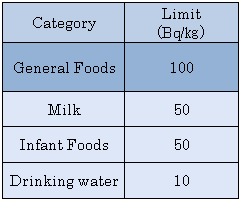Main content starts here.
Radiation tests for foods
Radioactive materials
Radiation is released when an unstable nucleus changes into a stable one, and similar to light rays, it has the ability to penetrate matter. This ability to release radiation is known as radioactivity, and materials with such characteristics are called radioactive materials.
Naturally occurring radioactive materials in the earth and air emit radiation. Foods include natural radioactive materials, and a large amount of radiation travels around in the universe, some of which reaches the surface of the Earth.
Despite being constantly exposed to small amounts of radiation, we are able to live without particularly noticing the effects of radiation on our health in our daily lives. However, radiation’s influence appears when you are exposed to a large dose of radiation at one time.
Limit of radioactive materials in food
Considering the influence of radioactive materials on health, additional radiation amount received from food intake should be below 1 millisievert annually, regardless of gender or age.
It is said that there is a potential effect of radiation on health when the lifetime additional accumulation of effective radiation dose is approximately 100 millisieverts or more.
(Limit of radioactive materials in food)

Radiation tests for foods
Kyoto Prefecture conducts systematic checks to confirm that the radioactive materials of agricultural, forest and fishery products remain below the safe limits. If products are found to exceed the safe limits then they are disposed of, while if a region is found to have a wide range of products exceeding the limits, measures such as distribution restrictions shall be put in place.
- Test results are as follows:
◇Agricultural, forestry and fishery products in Kyoto
No radioactive materials have been detected in any items tested so far.
- Test results of FY2017
- Test results of FY2016
- Test results of FY2015
- Test results of FY2014
- Test results of FY2013
- Test results of FY2012
◇Foods distributed within Kyoto
No radioactive materials have been detected in any items tested so far.
For more information
Please visit the following websites of the Consumer Affairs Agency for more information.
- Food and Radiation Q&A
- Food and Radiation Q&A mini (Seventh Edition)